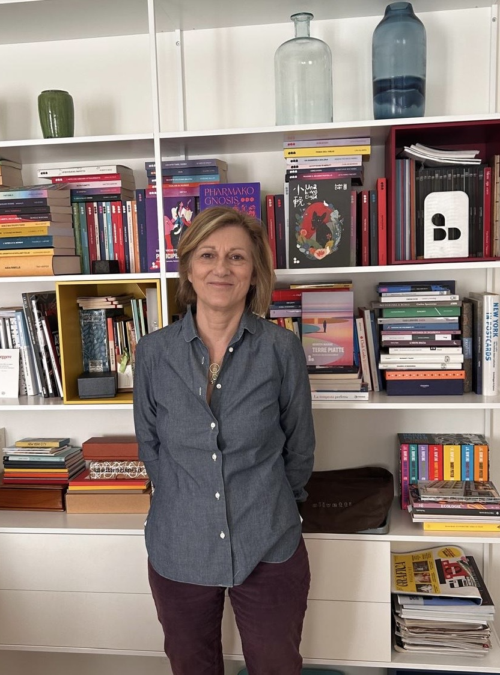Interview with Florence Raut
co-founder of ‘La Libreria’ – Paris
Author: Federica Malinverno, Actualitté

How did the ‘La Libreria’ project come about?
After some experience as a translator from Italian into French, I approached ‘Leggere per due’, a bookshop-cafe that only sold books in Italian, and its owner Gennaro Capuano, who, after sharing some cultural projects with me, was planning to sell his bookshop. I was interested in buying, but in the fourth arrondissement rents were very high.
Although I had no business or commercial experience, I read a lot. Besides, I liked people, and the project of founding a bookshop appealed to me. Then, about a year before ‘Reading for Two’ closed, Gennaro entrusted me with the bookshop and I found myself there, alone, making coffee, but also selling books. I discovered then, albeit belatedly, my vocation. And it was a very useful field experience.
When I decided to set up my own bookshop, I thought I would also like to sell books in French. So I did a short, intensive training at the National Institute for the Training of Booksellers (INFL) and opened a French-Italian bookshop with an Italian partner who left three years later.
So your project also included selling books in French?
At that time – it was 2006 – there were no French bookshops in the neighbourhood where I founded ‘La Libreria’, so I thought, at least in the early days, that I would also offer books in French. At first, we had a predominantly French neighbourhood clientele. By now, we have a loyal and established clientele in the neighbourhood, but with time, the Italian side has become more important in economic terms.
Who supplied you with books in Italian?
Essentially we dealt with an Italian wholesaler and Mondadori who distributes both Einaudi and Mondadori, for example, and represents a large part of Italian publishing. We also had a few other interlocutors for school books. Now we have expanded and are dealing with two wholesalers and for everything scholastic we mostly refer directly to specialised Italian publishers, from which we derive a large part of our earnings at certain times of the year.
How do you build your assortment?
Initially I was inspired by the assortment of Gennaro’s bookshop, adjusting it according to my literary tastes. Based on my knowledge and bibliographic work, we built an assortment ranging from Latin and Greek classics to Dante and Cavalcanti to the 19th century, the 20th century and contemporary authors such as Tabucchi, Ammaniti… Hard to mention them all, but we are definitely open to new things and discoveries!
Since you opened in 2006, have you noticed an evolution in the reception and perception of Italian literature by the French public?
In France, the perception of Italian literature is mainly linked to a dozen or so authors who are famous and recognised, such as, among contemporaries, Erri De Luca and Alessandro Baricco.
If we also think back to less recent years, the attitude towards Italian literature changed with Umberto Eco, with the success of The Name of the Rose (1980, Bompiani and 1981, Grasset). In more recent years, then, I remember the Goliarda Sapienza phenomenon (The Art of Joy came out in 2005). Then in January 2007 another author stood out, Milena Agus, published in France by Liana Levi and in Italy by Nottetempo: Mal di pietre became an editorial case. Finally, it was the turn of Elena Ferrante, published in Italy in 2011, which made a real leap forward in terms of sales.
How much do French books weigh on your overall turnover?
About 40 per cent of our turnover is made up of books in French by Italian authors but also French or other nationalities. The remaining 60% is made up of books in Italian.
How did sales go at the Salon du Livre de Paris 2023?
Based on what we usually sell in bookshops and on the experience I have had at other events such as Italissimo, we were able to build a bibliography of texts to propose at the Salon du Livre. Sales went well, we had to send relatively few books back to Italy. One of the most successful authors is Paolo Cognetti, followed by mystery writers (Gianrico Carofiglio, Maurizio De Giovanni, Donato Carrisi, Giancarlo De Cataldo), as well as female writers such as Stefania Auci and Goliarda Sapienza.
Are your regular bookstore sales still very dependent on the classics?
Some books by contemporary authors that we have proposed, such as Veronica Raimo, Alessandro Barbaglia or Fabio Bacà, have achieved very good results, but it is true that there are still many classics that sell regularly, in particular Moravia and Calvino. Moreover, the French public, especially adults, often look for classic authors and good writing, although we recommend different authors according to the readers’ level of knowledge of Italian. We sell a lot of Novecento and Seta by Alessandro Baricco, for example, as well as books by Erri de Luca.
Do you think the local or regional element is very important in the French public’s perception of Italian literature?
I think it is quite a lot. French literature does not have these regional connotations as important as those, which are pronounced, in Italian literature. And the French reader is very interested in Italian history, the regions: he wants to understand Italy through its literature.
Do you see any trends in Italian literature translated in France today?
It seems to me that there are very different publishers in France that propose Italian authors, both large publishers like Albin Michel or Gallimard, and very good but smaller publishers, like Liana Levi, Métailié, Le Tripode, les Éditions du Sous-Sol or le Nouvel Attila. These publishers translate different books along their own editorial lines, sometimes more literary and experimental, other times focusing on already well-tested models.










